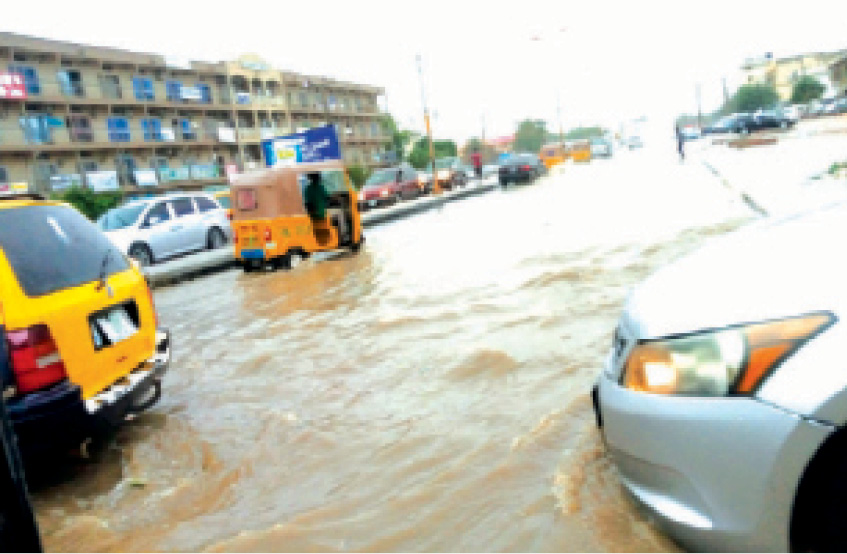Residents weigh options after NEMA’s flood report on Kano
The National Emergency Management Agency (NEMA) has recently warned that about 20 out of the 44 local government areas in Kano state are under a high risk of probable flooding. The report, released by Nigerian Meteorological Agency (NIMET) and the Nigerian Hydrological Services Agency (NIHSA) on the seasonal rainfall prediction has classified Tarauni, Garum Malam, […]

Zoo Road in Tarauni LGA shortly after a recent rainfall
The National Emergency Management Agency (NEMA) has recently warned that about 20 out of the 44 local government areas in Kano state are under a high risk of probable flooding.
The report, released by Nigerian Meteorological Agency (NIMET) and the Nigerian Hydrological Services Agency (NIHSA) on the seasonal rainfall prediction has classified Tarauni, Garum Malam, Rimin Gado, Gaya, Gezawa, Gwale, Shanono, Gabasawa, Gwarzo, Ungogo, Warawa, Dawakin Kudu, Dambatta, Bebeji, Kabo, Wudil, Kura, Nassarawa, Kano Municipal and Kumbotso as the identified LGAs at risk of flooding in the state.
It also predicted that the annual rainfall would be above normal in Nigeria thereby making some places at risk of flooding.
Chronicle talked to residents of these areas as well as other stakeholders in the sector to ascertain the level of their preparedness to avert the looming danger.
Kabiru Hassan, a resident Gwagwarwa area in the metropolis, said he usually mobilises people around his area to clear their gutters and other surroundings as one of their measures taken.
Similarly, Umar Bala of Rinjiyar Lemo, one of the areas that experienced the disaster in recent years, said “We are mostly the end victims of the refuse dumped in the drainage that emanates from Jakara, passing through Fagge to Kwarin Gogau down to our area (Rijiyar Lemo). We are appealing to the state government to help us do something about it; the problem is beyond our capacity”.
In Jakara, residents of the area also appealed to the government to come to their rescue, noting that they are one of the major vulnerable areas to the disaster in the city.
Also, residents of some parts of Goron Dutse, Kofar Waika and Kofar Dawanau lamented how structures built on drainages of the area have become major concerns to them.
“I remember two months ago when it rained heavily one Sunday night, virtually all the houses in these neighbouring areas were penetrated by water,” Nasiru Abdullahi, a resident of the area said.
According to Yusuf Idris Garba, a Natural Resource Management and Climate Change expert, the major causes of flooding in Kano are more of artificial than natural.
Garba, who lectures at the Department of Environmental Management of Bayero University, Kano, said “One of the causes is the issue of climate change that affects not only Kano but the world entirely.”
“If you visit the main drainages of the city around Jakara that passes through Fagge, linking almost all the major markets of the city, you’ll see refuse being dumped inside, and that has a serious implication,” the lecturer added.
On his part, the Executive Secretary of Kano State Emergency Management Agency (SEMA), Dr. Sani Aliyu Jilli, said his agency was working with NEMA to tackle the problem.
He said an awareness/sensitisation campaign was launched last week at Rimin Gado in collaboration with NEMA, Red Cross and other relevant stakeholders while they were also working with relevant ministries “to see that refuse dumped in our drainages are packed immediately.”
While appealing to the residents to play their parts, he said his commission had already procured relief materials should the problem occur to help the potential victims cushion its effect.
